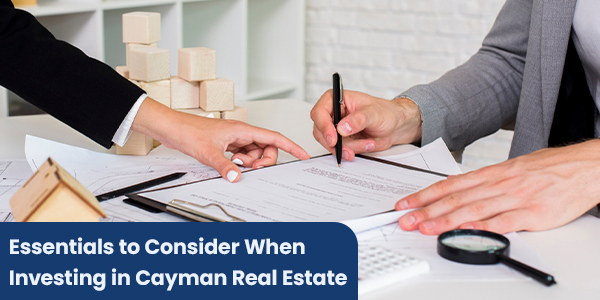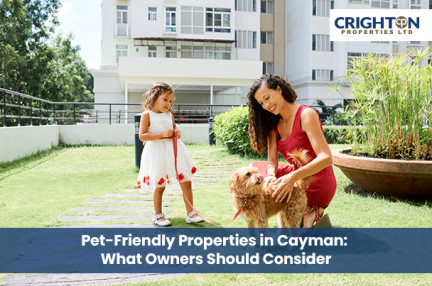
Ways to Add Value to Your Cayman Property Through Renovation
Discover smart renovation ideas that increase your Cayman property value, attract buyers, and maximize ROI in today’s competitive real estate market.
Crighton Properties | May 28, 2025
The Cayman Islands is a top choice for real estate investors who prioritize long-term value, an island lifestyle, a high standard of living, and potential investment.
If you are considering a property investment here, you must understand. Cayman real estate glossary, which we have covered in this Cayman property investment guide.
Before that, let us quickly understand why investors prefer real estate investment in this beautiful place and the key factors to consider before buying property here.
Global investors prefer putting their money in Cayman Islands real estate because of high returns, steady growth, and constant demand.
The Cayman real estate market, with various residential homes and waterfront spaces, offers freehold properties that attract investors.
The Cayman Islands are also strategically located, as daily flights connect them to major cities such as Miami, New York, and Toronto. These are a few reasons why people invest in properties here.
However, it is integral that you stay updated with real estate terms in Cayman to avoid confusion while investing in the market.

Consider the following factors before investing in Cayman properties:
Here's a list of 22 real estate terms in Cayman with their basic meanings that every investor needs to know:
1. Freehold vs. Leasehold
Freehold land means that you own the property indefinitely, while leasehold land means you can occupy or use the property for a pre-decided period.
2. Return on Investment
A parameter that you can use to evaluate the profitability of your property. ROI is generally calculated as the overall cost of the property minus resale value. The gains generated would be the return on investment.
3. Covenants
Legal rules attached to your property that dictate what you can and cannot do – for example, 'type of residential property that can be constructed,' or 'minimum square footage, etc.
4. Real Estate Financing Terms
Details such as the interest rate you agree to, the length of repayment, and the monthly payments. These are critical if you are financing real estate in Cayman.
5. Land Register
An official document prepared and maintained by the government to confirm the owner of real estate, and details of any claims or boundaries attached to that property.
6. Title Insurance
Insurance (not mandatory) that protects the buyer from inappropriate or disputed ownership claims.
7. Title Search
Legal examination of the property records to confirm that the owner actually owns the property. It verifies any undisclosed claims or debts attached to the property.
8. Strata Title
A common title type in condos, which means you own a specific unit but share the right to common areas like recreation amenities, gym, garden, etc.
9. Easement
A legal right to let another person use part of your land, like a driveway or garden area.
10. Fixtures and Fittings
These are items that are attached to the property, such as light fixtures, built-in wardrobes, which will be included in the sale document.
11. Completion Date
The date the property is legally transferred. It is the official date when the ownership of the property is handed over to the buyer.
12. Offer to Purchase
A written offer made by a buyer to a seller that includes the proposed price and terms to purchase a property.
13. Seller’s Minimum Price
The lowest price a property seller is willing to accept during a negotiation. While not always publicly disclosed, this figure helps guide serious offers and ensures that bids align with the seller’s expectations — especially in competitive or high-demand scenarios.
14. Appreciation
The gain in property value can be due to several reasons, like increased demand or growth in your area.
15. Encumbrance
Any claim, charge, or liability legally attached to the property may limit the use of the property and the future sale.
16. Vendor
The person or entity selling the property (commonly referred to in legal contracts and sale documents)
17. Types of Property Tenure
A legal classification under which property is held, for example, freehold, joint ownership, or leasehold.
18. Built-Up Area
The total area of the construction, including internal walls, balconies, and terraces (not just the living area).
19. Real Estate Financing
The process of arranging borrowed money (like loans) to help cover the cost of purchasing a property.
20. Licensing
Permits and approvals to build, alter, or use a property in certain ways. This is critical for land development.
21. Interior Usable Space
This refers to the finished floor area inside the property that can be used for daily living — where you can place furniture, walk, or live comfortably. It does not include exterior walls, patios, or common areas, making it a practical measure of the livable indoor space in a Cayman home.
22. Sale Agreement
The legally enforceable contract between the parties involved in the property sale. It defines the terms, timelines, and obligations of the property sale.
By understanding real estate terms in Cayman, you simplify the jargon, educate yourself, be better prepared, and eventually make lucrative investments.
It is crucial to learn must-know real estate terms, like strata title, ROI, or encumbrance, before you review or negotiate an offer. This will help you avoid wasted time or lost money.
Crighton Properties is a recognized service in the Cayman Islands real estate market that has years of experience. If you are looking for Cayman Islands real estate for sale, or if you need assistance through the purchasing process, or for comprehending real estate terms in Cayman, an expert team of experts will assist you.
Check out the latest properties for sale in the Cayman Islands, and allow us to help you get started.
A Strata Title covers buildings such as condos, which include common areas, while a Freehold Title signifies ownership of both the land and structure.
No, many international buyers buy property remotely with their local attorney or real estate agent. All you need is professional real estate assistance from experts who can help you with the process.
Yes, you can purchase raw land and initiate construction in the Cayman Islands. However, you must conduct due diligence on zoning, obtain building permits, and incorporate hurricane and flood-prone designs before building your home.

Discover smart renovation ideas that increase your Cayman property value, attract buyers, and maximize ROI in today’s competitive real estate market.

Looking for a pet-friendly home in Cayman? Learn key factors pet owners should consider, from amenities to community rules and more.

Explore expert predictions for the Cayman Islands real estate market over the next decade — trends, growth, and investment opportunities.